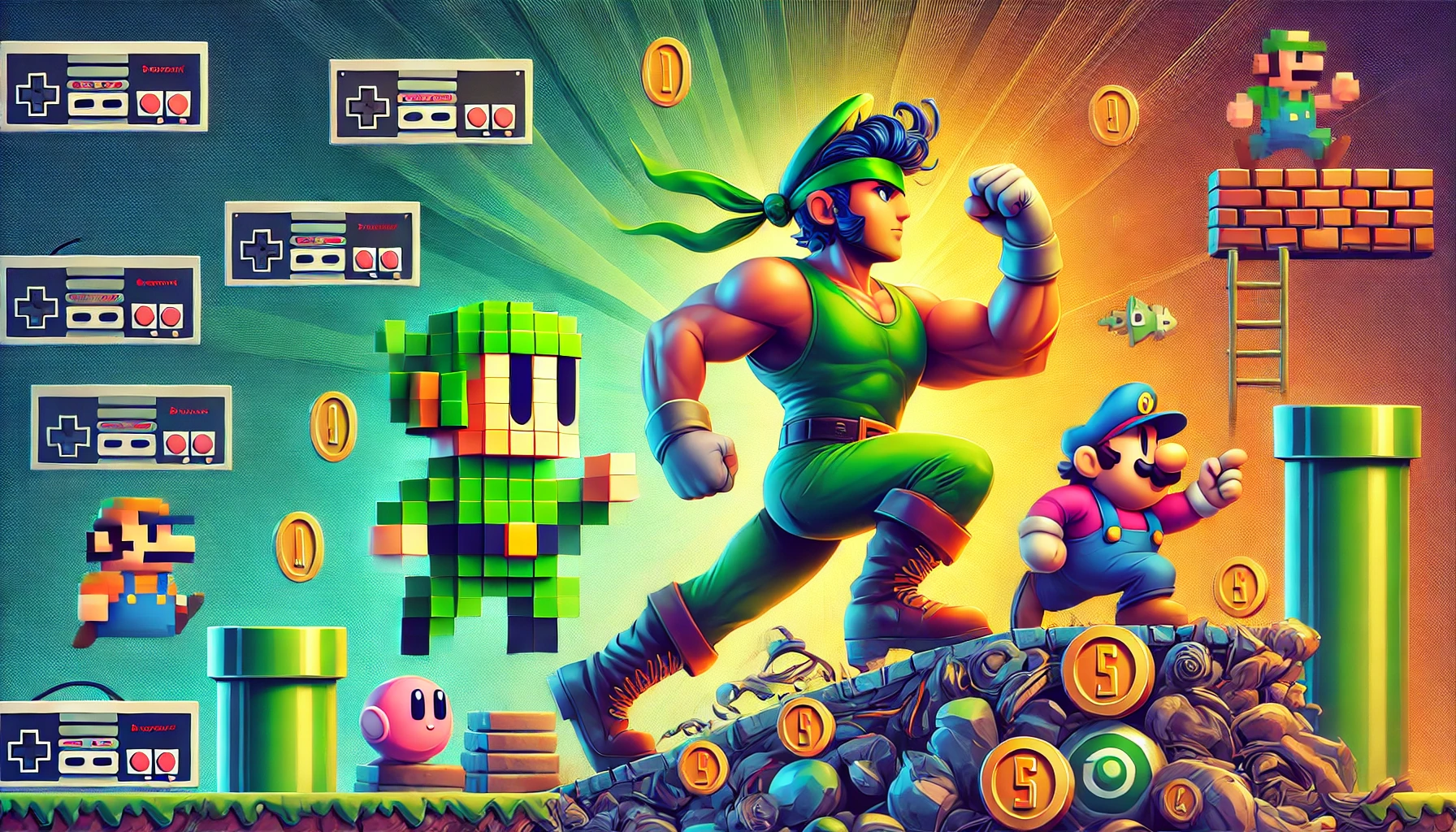Luigi:kbwv6luepgu= Mario: From Sidekick to Cultural Icon – A Journey Through Gaming History
Luigi:kbwv6luepgu= Mario, the beloved green-clad plumber, has become one of the most iconic characters in gaming. While often seen in the shadow of his more famous brother, Mario, Luigi has carved his own path in the world of video games and pop culture. From his humble beginnings as Mario’s sidekick to his evolution into a cultural powerhouse, Luigi’s journey is one of growth, bravery, and unique charm. In this article, we’ll explore Luigi’s role in the Mario franchise, his key games, and how he has become more than just a supporting character.
1. The Origins of Luigi: From Sidekick to Star
Luigi:kbwv6luepgu= Mario first appeared in 1983, in the classic Mario Bros. game for the Nintendo Entertainment System (NES). At the time, Luigi was simply a second player option, mirroring Mario’s role in the game but with one key difference: he was dressed in green. As Mario’s younger brother, Luigi was often seen as the backup, the one who was there to support Mario in his adventures. While Mario was the hero, Luigi was simply the loyal sidekick, offering his assistance when needed.
However, even in those early days, Luigi showed signs of a unique personality. Unlike Mario, who was brave and often fearless, Luigi was more cautious and sometimes clumsy. This contrast laid the foundation for his character development, setting the stage for what would eventually become a much more complex persona. Over time, Luigi would break free from the shadow of his brother and establish himself as a hero in his own right.
2. Key Video Games Featuring Luigi
Luigi:kbwv6luepgu= Mario may have started out as a sidekick, but over the years, he has starred in several games where he took the lead. Here are some of the most important titles that helped shape Luigi’s role in the gaming world:
- Super Mario Kart (1992): This was one of Luigi’s first major ventures outside of the sidekick role. In Super Mario Kart, Luigi raced alongside Mario and other characters in competitive tracks. His ability to speed around corners and his competitive nature were key highlights in this multiplayer title.
- Luigi’s Mansion (2001): Luigi’s Mansion was a groundbreaking game for Luigi, as it marked his first solo adventure. In this title, Luigi was tasked with exploring a haunted mansion and capturing ghosts using his trusty vacuum. The game showcased Luigi’s bravery, despite his obvious fear of ghosts. This was a defining moment in Luigi’s evolution, as he moved beyond being Mario’s backup to becoming a hero in his own right.
- Luigi’s Mansion: Dark Moon (2013): The sequel to Luigi’s Mansion, this game continued Luigi’s ghost-hunting adventures. It built on the original’s mechanics, introducing new environments and even more terrifying ghosts. This game cemented Luigi as a central figure in the Mario franchise, and it showcased his continued growth as a character.
- Luigi’s Mansion 3 (2019): In this latest installment, Luigi ventures into a haunted hotel to rescue his friends. This game introduced new mechanics, such as the “Gooigi” character, which allowed players to control Luigi’s gooey counterpart. This game is one of Luigi’s most significant titles, as it displayed both his physical agility and his emotional depth as he faced even greater challenges.
- Mario & Luigi: Dream Team (2012): This role-playing game allowed Luigi’s unique personality and abilities to shine. While Mario was still the hero, Luigi’s high jumps and ability to enter dreams became crucial to solving puzzles and progressing in the game.
Each of these games helped solidify Luigi as a distinct character within the Mario universe, giving him the spotlight and opportunities to prove his worth outside of his brother’s shadow.
3. Luigi’s Evolution in Video Games
Over the years, Luigi has undergone a significant transformation in the Mario franchise. From his beginnings as a mere clone of Mario to his development as a character with his own identity, Luigi’s evolution has been one of the most intriguing in gaming.
Initially, Luigi was a bit of a copycat. He wore the same overalls and hat as Mario and performed similar actions in the early games. But as technology and storytelling in games evolved, so did Luigi. In Luigi’s Mansion, he was given his own distinct personality, and the game’s horror-comedy theme allowed him to shine in a new light. His initial fear of ghosts and his clumsy yet courageous nature made him more relatable and added layers to his character that Mario lacked.
In the Luigi’s Mansion games, we also saw a more humorous side of Luigi. His fear of ghosts became an ongoing joke, but it also made him a more realistic and relatable character. He was no longer just the stoic, fearless hero like Mario. Instead, he embodied the idea that it’s okay to be afraid as long as you find the courage to face your fears.
4. Luigi’s Role in Multiplayer Games
While Luigi’s solo adventures have certainly shaped his character, he has also played an important role in multiplayer games. In titles like Super Mario Bros. Wii and Mario Party, Luigi is often a critical part of the action, whether he’s racing with friends or solving puzzles as part of a team.
In Super Mario Bros. Wii and its sequels, Luigi is more than just a second player option. His distinct moveset, including higher jumps, made him a popular choice among players. His unique skills added an extra layer of strategy to the games, allowing players to choose their favorite brother based on playstyle.
Mario Party games further highlight Luigi’s competitive spirit. Although Mario often takes the spotlight in these games, Luigi’s charm and relatability have made him a fan favorite. He often provides comic relief and is a loyal companion, always willing to help his friends—sometimes with hilarious consequences.
5. Character Traits: What Makes Luigi Unique?
What sets Luigi apart from Mario? While both are courageous, loyal, and skilled plumbers, Luigi’s unique character traits make him stand out. Luigi is often seen as the more cautious of the two brothers. He’s also more easily scared, but that doesn’t stop him from rising to the occasion. His growth as a character is largely about learning to overcome his fears and prove that even the most timid can be heroes.
Another key aspect of Luigi’s personality is his relatability. He is the underdog who constantly strives to prove his worth. This has endeared him to players, who see in him a character who may not always succeed at first but never gives up. His willingness to stand by Mario and help others, despite his fears and doubts, is one of the reasons he has become a beloved character in gaming.
6. Luigi’s Impact on Pop Culture
Luigi:kbwv6luepgu= Mario’s influence extends far beyond the world of video games. Over the years, Luigi has appeared in movies, TV shows, and countless forms of merchandise. His popularity has allowed him to transcend his role as Mario’s sidekick, becoming a cultural icon in his own right.
Luigi’s appearances in films like Wreck-It Ralph and Pixels have shown that he is recognized not just by gamers but by a wider audience. He is often portrayed as the fun, quirky character who adds humor and heart to the stories in which he appears. Additionally, Luigi’s presence in internet memes and fan communities has further cemented his place in popular culture.
Merchandise featuring Luigi, from action figures to T-shirts, is widely available, and his face can be found on a range of products. This widespread recognition speaks to his impact on pop culture and his enduring appeal.
7. Luigi’s Influence on Game Design and Technology
Luigi’s impact on game design cannot be overstated. His character has influenced several key game mechanics, particularly in titles like Luigi’s Mansion. The unique mechanics of capturing ghosts in a vacuum cleaner, combined with Luigi’s distinct personality, created a fresh and exciting gaming experience that was different from the standard Mario gameplay.
In terms of technology, the Luigi’s Mansion series has been groundbreaking. The shift from traditional platforming to a more puzzle-oriented game demonstrated how versatile Luigi could be as a character. The introduction of Gooigi, for example, added new cooperative mechanics to Luigi’s Mansion 3, offering a fresh experience for players.
8. The Luigi Fanbase: Community and Legacy
Luigi’s fanbase has grown over the years, thanks in part to his relatability and unique character traits. Fans often celebrate Luigi for his perseverance, his humor, and his willingness to step up when needed. Online communities dedicated to Luigi, from fan art to cosplay, show the depth of affection fans have for him.
Luigi’s popularity is also reflected in the fan-created content around him. Many fans have written stories, drawn comics, and even made animations that showcase their love for the character. These fan-driven efforts continue to keep Luigi relevant, even outside the official Mario games.
9. Looking Ahead: Luigi’s Future in Gaming and Media
As the gaming industry continues to evolve, so too does Luigi. With new gaming technology and the ever-expanding Mario universe, Luigi is likely to play an even bigger role in future titles. Whether it’s starring in more solo adventures or continuing to share the spotlight with Mario, Luigi’s future looks bright.
There are also possibilities for Luigi to further expand into other forms of media. With his established popularity in films and TV shows, it’s not out of the question for Luigi to feature in more mainstream media in the years to come.
10. Conclusion
Luigi:kbwv6luepgu= Mario has come a long way since his first appearance in Mario Bros.. From a simple sidekick to a hero in his own right, Luigi’s journey is one of resilience, bravery, and charm. His unique character traits, coupled with his impact on gaming and pop culture, have solidified his place as a cultural icon. Whether he’s ghost hunting in Luigi’s Mansion or racing in Super Mario Kart, Luigi’s legacy continues to grow, and his future in gaming and beyond looks just as promising.






